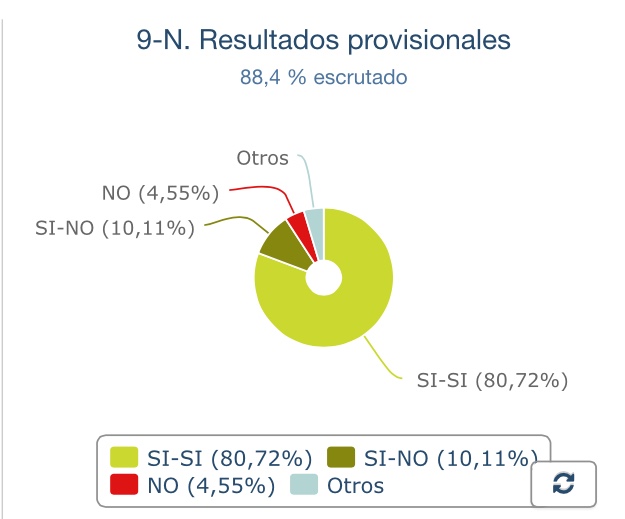With over 2,225,000 votes cast in the Catalan participatory vote in Catalonia alone, what has become known as the new 9N can be considered a massive success for both democratic principles and the Catalan people. With 80% of voters voting in favour of outright independence, it really looks like the Spanish government would be wise to start to take notice of the wishes of the Catalan people, although given their track record and initial statements from the Minister of Justice last night, this seems unlikely.

As you can see from the graphic above with 84% of votes counted, the Si-Si votes have come out a clear winner with an estimated 80% of votes counted. At the time of writing, this amounted to 1,649,239 in favour of independence from Spain.
Please remember that the question was "Are you in favour of Catalonia becoming a state? In the case of an affirmative answer, do you want that state to be independent?"
The Si-Nos, who want to see significant changes to the Spanish constitution and have Catalonia remain within a Federal Spain, polled 10% whilst those clearly against any change in the current relationship between Catalonia and Spain polled 4,55%.
Obviously, the results of the Catalan Participatory Vote would not be replicated in a legal referendum because yesterday the Si-Sis were the group who were most motivated to vote. If a legal referendum were agreed with the Spanish government, both the Nos and the Si-Nos would be able to mount a campaign and the opinions would be more evenly spread, although yesterday's results very strongly suggest that a clear majority of Catalans are in favour of independence from Spain.
Given the organisational difficulties of mounting a symbolic referendum of this type and the campaign against its validity from central government, getting well over 2 million people out to vote can only be considered an extraordinary success. It's obvious that the Catalan people want to be allowed to give their opinion on their political future and the Spanish government would be well advised to take note.
As I said before, allowing a legal referendum would mean that there would finally be a debate on Catalan independence and those against would be able to warn against the dangers of separation and also explain the advantages of Catalonia remaining in Spain. The tactic of prohibiting everything and denigrating Catalans' wishes to express themselves democratically has only led to a growing number of Catalans becoming pro-independence over the last couple of years.
However, the immediate reaction of the Spanish Minister of Justice, whose name oddly enough is Rafael Catalá, was to describe the Catalan participatory vote as a propaganda exercise with no legal or democratic validity. The Spanish public prosecutor is also looking into the possibility of taking legal action against those involved in the organisation of yesterday's symbolic celebration.
After he cast his vote yesterday, Artur Mas made a statement in Catalan, in which he switched to Castilian Spanish for a few seconds in order to say "el responsable soy yo" - "I'm responsible". If the Spanish Justice Minister decides to prosecute President Mas, he won't only foment the pro-independence lobby but will also create a hero-cum-martyr so he would be well-advised to let sleeping dogs lie.
If the Spanish government don't agree to a referendum, then sooner or later Mr Mas will call plebiscitary elections. These are normal Autonomic Elections that would be turned into a proxy referendum by the campaigns of the parties. President Mas's preferred option is for the pro-independence parties (his own CiU, Esquerra Republicana and the CUP) to stand together on a pro-independence ticket.
However, Esquerra Republicana want to declare independence unilaterally whilst Artur Mas favours continuing negotiations with Spanish central government. It's going to be difficult for the two main independence parties to come to an agreement on this so Catalan politics are going to remain in the news for some time to come.
***
If you are interested in the background historical reasons to the Catalan Independence movement, you may be interested in my book Catalonia Is Not Spain: A Historical Perspective.
It is available in paperback and Kindle version across the Amazon network.
Click here to buy Catalonia Is Not Spain: A Historical Perspective by Simon Harris on Amazon.es
Click here to buy Catalonia Is Not Spain: A Historical Perspective by Simon Harris on Amazon.co.uk
Click here to buy Catalonia Is Not Spain: A Historical Perspective by Simon Harris on Amazon.com